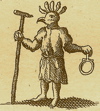 Johann Dieter Wassmann, Chaste, Grace, Avarice, Mirth & Lust, 1897. 44 x 35 x 15 cm.
Johann Dieter Wassmann, Chaste, Grace, Avarice, Mirth & Lust, 1897. 44 x 35 x 15 cm.The respected curator Daniel Birnbaum trumpets his upcoming Torino Triennale with the afflactus that, “The 50 Moons of Saturn…will present works that transform melancholy into a state of mind inspired by generosity, rebellion and joy.”
To aid him on his journey, we have, in recent weeks, delved into this labyrinth of melancholy through the art of Johann Dieter Wassmann. Today, we pair one of Johann’s final works before his untimely death, CHASTE, GRACE, AVARICE, MIRTH & LUST, 1897, with a selection from Robert Burton’s THE ANATOMY OF MELANCHOLY, 1621, to posit the surest cure for melancholy: mirth.
“‘Mirth,’ (saith Vives) ‘purgeth the blood, confirms health, causeth a fresh, pleasing, and fine colour,’ prorogues life, whets the wit, makes the body young, lively and fit for any manner of employment. The merrier the heart the longer the life; ‘A merry heart is the life of the flesh,’ Prov. xiv. 30. ‘Gladness prolongs his days,’ Ecclus. xxx. 22; and this is one of the three Salernitan doctors, Dr. Merryman, Dr. Diet, Dr. Quiet, which cure all diseases -- Mens hilaris, requies, moderata dieta. Gomesius, præfat. lib. 3. de sal. gen. is a great magnifier of honest mirth, by which (saith he) ‘we cure many passions of the mind in ourselves, and in our friends;’ which Galateus assigns for a cause why we love merry companions: and well they deserve it, being that as Magninus holds, a merry companion is better than any music, and as the saying is, comes jucundus in via pro vehiculo, as a wagon to him that is wearied on the way. Jucunda confabulatio, sales, joci, pleasant discourse, jests, conceits, merry tales, melliti verborum globuli, as Petronius, Pliny, Spondanus, Caelius, and many good authors plead, are that sole Nepenthes of Homer, Helena's bowl, Venus's girdle, so renowned of old to expel grief and care, to cause mirth and gladness of heart, if they be rightly understood, or seasonably applied…
“For these causes our physicians generally prescribe this as a principal engine to batter the walls of melancholy, a chief antidote, and a sufficient cure of itself. ‘By all means’ (saith Mesue) ‘procure mirth to these men in such things as are heard, seen, tasted, or smelled, or any way perceived, and let them have all enticements and fair promises, the sight of excellent beauties, attires, ornaments, delightsome passages to distract their minds from fear and sorrow, and such things on which they are so fixed and intent.’ ‘Let them use hunting, sports, plays, jests, merry company,’ as Rhasis prescribes, ‘which will not let the mind be molested, a cup of good drink now and then, hear music, and have such companions with whom they are especially delighted;’ ‘merry tales or toys, drinking, singing, dancing, and whatsoever else may procure mirth:’ and by no means, saith Guianerius, suffer them to be alone. Benedictus Victorius Faventinus, in his empirics, accounts it an especial remedy against melancholy, ‘to hear and see singing, dancing, maskers, mummers, to converse with such merry fellows and fair maids.’ ‘For the beauty of a woman cheereth the countenance,’ Ecclus. xxxvi. 22. Beauty alone is a sovereign remedy against fear, grief, and all melancholy fits; a charm, as Peter de la Seine and many other writers affirm, a banquet itself…”
Let the banquet begin...
50 Moons of Saturn
Curator: Daniel Birnbaum
Torino Triennale
6 November 2008 – 1 February 2009
http://www.torinotriennale.it/

No comments:
Post a Comment